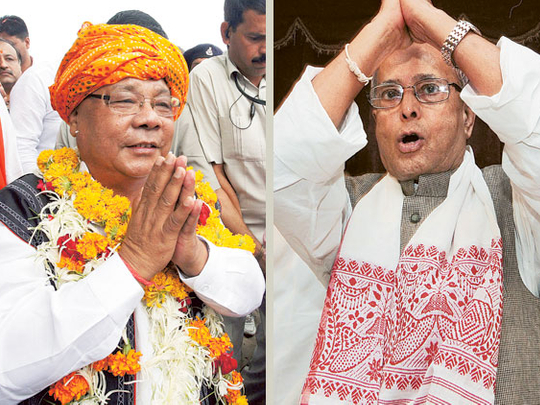
New Delhi: Never in recent times has the presidential election in India grabbed so much attention. The ruling Congress party wants its ace troubleshooter and former finance minister Pranab Mukherjee to go to Rashtrapati Bhavan whereas, after much hesitation and brainstorming, the main Opposition Bharatiya Janata Party (BJP) has thrown former Lok Sabha speaker P.A. Sangma into the fray to set up what they describe ‘a formidable fight’.
As a matter of fact, over the last few days, a lot of space in leading newspapers and airtime on prime news channels has been reserved for the election, which generally passes off rather uneventfully. Many political pundits are dubbing the contest as the most interesting presidential elections since 1977. The announcement of Mukherjee and Sangma as candidates by the rival parties has led to fast-paced political developments in the country.
With the possibility of an early general election, the presidential election has chartered a new course for possible realignments among the partners of United Progressive Alliance (UPA) at the federal level besides the National Democratic Alliance (NDA) in the opposition. Already serious differences of opinion have surfaced within some parties, none more apparent than among the Communists, the Nationalist Congress Party (NCP) and Janata Dal (JD).
“Both UPA and NDA are using this election as the preparing ground for the 2014 parliamentary elections. In this case, the selection of presidential candidates has assumed more importance as it can become either a precursor for the forging of new alliances. On the other hand, the nomination of a particular candidate can prove to be the alliance breaker. The best example of this is the Trinamool Congress’ opposition to Mukherjee. The presidential election may well be termed as indicator of the mood of the various political parties before the 2014 parliamentary elections,” political affairs expert Rakesh Sapru Kak told the Gulf News.
The recent commotion in political circles has been mainly due to these realignments, primarily of the regional parties like Samajwadi Party (SP), Trinamool Congress (TMC), All India Anna Dravida Munnetra Kazhagam (AIADMK), etc. These parties want to play a major role in deciding the prime minister rather than the president. In fact, Karunanidhi’s Dravida Munnetra Kazhagam (DMK) immediately welcomed the nomination of Mukherjee; so much so that Karunanidhi sent a letter to Congress president Sonia Gandhi congratulating her on her choice.
The presidential battle is a lost cause notwithstanding Sangma’s hope that in a secret ballot legislators would hear the call of their conscience and vote for him defying party diktats. Even if that were to be the case, it is doubtful if Sangma will garner the requisite numbers.
Sangma’s candidature was first supported by Biju Janata Dal, then by the AIADMK led by Jayalalithaa and later, when A.P.J. Abdul Kalam dropped out of the race, by all parties which oppose the Congress and Mukherjee.
Despite his unrealistic chances, Sangma maintains that a miracle will see him become the first tribal to assume the president’s office after the vote on July 19.
Mukherjee’s 40-year political career is also marred by controversies. Many recall his record of excesses during the infamous Emergency imposed in 1975 by then prime minister Indira Gandhi — for which Mukherjee was hauled up by the Shah Commission.
Interestingly, both the presidential candidates have been at loggerheads since they filed their nominations. Sangma’s election agent Bhartrihari Mahatab had sought that Mukherjee be disqualified from the race as he held an office of profit as chairman of the Indian Statistical Institute on the day he filed his nomination papers last month. But the Election Commission rejected the demand to re-examine Mukherjee’s nomination.
Two days ago, Mukherjee took a dig at his rival Sangma over the BJP-backed candidate’s remark that he is a ‘failed’ finance minister, and that the president’s office was being turned into a place where he could be offloaded.
Currently on a country-wide poll campaign trail, Mukherjee said, “these sorts of phrases should not be used. Whether I have failed or succeeded, surely posterity will judge. I will not comment on it.”
Unlike the US, the Indian constitution places the responsibility of electing presidents on elected representatives to the parliament and state assemblies. Even though the Indian president occupies only a ceremonial post, he is regarded as the First Citizen of the country and thus it is imperative that the moral integrity of the office is not compromised.
“Thanks to the ‘Civics’ subject that we are taught in the school, we are aware that such a post exists in the country but do we all not know that he is merely a rubber stamp. President, who is also the head of the armed forces, only stamps away numerous Bills and appointments of bureaucrats and diplomats,” Kak said.
Meanwhile, Mukherjee yesterday met members of the ruling National Conference-Congress coalition and opposition People’s Democratic Party (PDP) in Srinagar to drum up support for his bid to enter the Rashtrapati Bhavan.
The National Conference has 28 Members of Legislative Assembly, five Members of Parliament and enjoys the support of an independent MP from Ladakh, while Congress has 17 state legislators and four parliamentarians in Jammu and Kashmir. The PDP has 21 legislators but no presence in the parliament.












